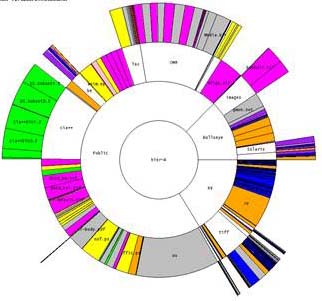HCDE 511:
Information Visualization
Spring 2014, Profs. Cecilia Aragon and Polle Zellweger
(Readings and assignments due on date of indicated class. Schedule subject to change.)
Week 1: Tuesday, April 1 Introduction / Data Types and Visual Mappings
Readings
- Introduction, Chapters 1-2, Now You See It: Simple Visualization Techniques for Quantitative Analysis,
by Stephen Few, Analytics Press, 2009 (required textbook).
- Chapter 2, Show Me the Numbers: Designing Tables and Graphs to Enlighten, 2nd ed., by Stephen Few, Analytics Press,
2012 (chapter available on Catalyst site).
Assignments (due by 5pm Tuesday)
- Download and install Tableau before class on Tuesday.
- Post an introduction to the class discussion board following the instructions there.
- Turn in 511 Group Info Form (available on Catalyst site).
Links
Week 2: Tuesday, April 8
Data Encoding / Graphical Excellence and Integrity / How to Critique a Visualization
Readings
- Chapter 3, Now You See It, by Stephen Few
- Chapters 1-2 from Visual Display of Quantitative Information. Tufte. (see Catalyst site for PDF)
- Designing Great Visualizations by Jock Mackinlay at Tableau Software (see Catalyst site for PDF)
Assignments (due by midnight before class)
Week 3: Tuesday, April 15
Tableau Tutorial / Exploratory Visual Analysis
Readings
Assignments (due by midnight before class)
Assignments (due 5pm Saturday, April 19)
Week 4: Tuesday, April 22Interaction / Visual Perception
Readings
- Chapter 4, Now You See It, by Stephen Few
- Interactive Dynamics for Visual Analysis, Heer and Shneiderman, 2012 (See Catalyst site for PDF).
- Perception in Visualization (html), C. Healey, 2011.
Assignments (due by midnight before class)
Week 5: Tuesday, April 29 Color and Luminance Contrast / Visual Perception 2 / Guest Lecture by Maureen Stone
Readings
- Chapter 5, Now You See It by Stephen Few
- Expert Color Choices for Presenting Data, Maureen Stone, 2006 (See Catalyst site for PDF)
- The first 4 pages of http://poynton.com/PDFs/ColorFAQ.pdf
- Whisper, Don't Scream: Characterizing Subtle Grids, Bartram & Stone, InfoVis 2007 (See Catalyst site for PDF)
Please install the following 2 apps before class (one has alternate versions for PC/Mac)
Links (for use with in-class exercises)
Assignments (due by midnight before class)
Week 6: Tuesday, May 6
Mid-term Presentations
Readings
-
Chapters 6 and 12 from Now You See It
- A Tour Through the Visualization Zoo. Jeff Heer, Michael Bostock, & Vadim Ogrievetsky, CACM June 2010.
- A conversation with Jeff Heer, Martin Wattenberg, & Fernanda Viegas, ACM Queue 2010.
- Wrangler: Interactive Visual Specification of Data Transformation Scripts. Sean Kandel, Andreas Paepcke, Joseph Hellerstein, Jeffrey Heer, CHI 2011.
- Optional: Magic Ink (html), Bret Victor, 2006, pages 1-47 (stop at the section entitled "Designing a design tool")
Assignments
- Mid-term presentations due today (should be uploaded to GoPost no later than 5pm before class)
Week 7: Tuesday, May 13
Multivariate Analysis / Animation / Distortion / 3D in Visualization
Readings
- Now You See It, pp. 143-162 (first half of chapter 7).
- Hans Rosling, Debunking myths about the 'third world.' (Gapminder video), TED conference talk 2006.
- Robertson, Fernandez, Fisher, Lee, and Stasko, Effectiveness of Animation in Trend Visualization (pdf), Proc. IEEE InfoVis 2008.
- Optional:
Evaluating the effectiveness of
spatial memory in 2D and 3D physical and virtual environments,
Cockburn and McKenzie, CHI 2002.
- Optional: Jeff Heer and George Robertson,
Animated Transitions in Statistical Data Graphics (pdf), Proc. IEEE InfoVis 2007.
- Optional:
Bay-Wei Chang, David Ungar (ACM, 1995),
Animation: From Cartoons to the User Interface
- Optional:
Andy Cockburn et al. (Computing Surveys, 2009),
A Review of Overview+Detail, Zooming, and Focus+Context Interfaces
Links
Week 8: Tuesday, May 20
Visualization Tools: Guest Lecture by Jeff Heer / D3 Workshop / Text Visualization
Readings
-
Optional: Protovis: A Graphical Toolkit for Visualization,
Michael Bostock, Jeff Heer, IEEE Trans. Visualization & Comp. Graphics (Proc. InfoVis), 2009.
-
D3: Data-Driven Documents,
Michael Bostock, Vadim Ogievetsky, Jeff Heer,
IEEE Trans. Visualization & Comp. Graphics (Proc. InfoVis), 2011.
-
Optional: Search User Interfaces,
Chapter 11: Information Visualization for Text Analysis,
Marti A. Hearst, Cambridge University Press, 2009.
Links
Week 9: Tuesday, May 27
Storytelling: Guest Lecture by Jock Mackinlay / Trees and Networks / Collaborative Visualization
Readings
- Robert Kosara and Jock Mackinlay, Storytelling: The Next Step for Visualization (pdf), IEEE Computer, vol. 46, no. 5, pp. 44-50, May 2013.
-
Jeff Heer and danah boyd, Vizster: Visualizing Online Social Networks (pdf). Proc. IEEE Infovis 2005.
-
Optional: Jeffrey Heer, Fernanda Viegas and Martin Wattenberg, Voyagers and Voyeurs: Supporting Asynchronous Collaborative Visualization, CACM January 2009.
-
Optional: Edward Segel and Jeffrey Heer, Narrative Visualization: Telling Stories with Data, Proc. InfoVis 2010.
Links
Week 10: Tuesday, June 3
Final Project Presentations
Readings
- No readings; work on projects.
